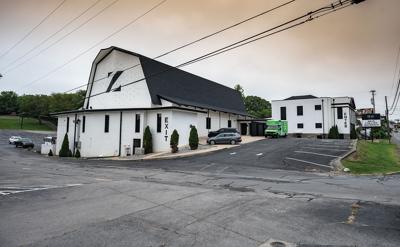Street View is a monthly column taking a close look at development-related issues affecting different neighborhoods throughout the city.
In November, West Nashville-based Zeal Church had a big announcement. “Proverbs 19:21 tells us that man makes many plans, but it’s the plan of the Lord that will prevail,” read a post on the church’s website titled “Future Announcement #2.” Specifically, the church’s leaders were referring to a parcel of land they’d bought and where they planned to move, just five minutes from their Charlotte Pike location.
But despite their big plans, Zeal didn’t get the new location after all. After a monthslong saga of near-tie votes and deferrals at the Board of Zoning Appeals, Metro Council District 1 residents blocked Zeal from becoming their new neighbors.
How did they do it? Well, partially through the dedication of District 1 Councilmember Joy Kimbrough.
“This is the only time I’ve appeared before the BZA in strong opposition to something, and I’m only doing it because I am trying to properly represent my community,” Kimbrough told the BZA at a June 6 meeting. “The people who live there don’t support it, the people who live around there don’t support it, and the people who are transiting through there who are in my district don’t support it.”
Much of the opposition to Zeal came from the church’s plan to build near Cato Road and other small streets that likely wouldn’t handle increased traffic well. Zeal services can have as many as 2,000 attendees. (Many opponents of the church’s plan have referred to Zeal as a “megachurch,” though the Hartford Institute for Religion Research defines a megachurch as having a “sustained weekly attendance of 2,000 persons or more.) Kimbrough tells the Scene it’s already a tight fit for two cars driving in opposite directions to pass each other on the street that churchgoers would enter from. While the Nashville Department of Transportation and Multimodal Infrastructure reviewed a traffic study for Zeal’s new location, there were some hiccups, with BZA members and Kimbrough not receiving the study until the night before the church’s initial zoning vote was held, causing further delays.
Alongside Kimbrough, District 1 residents organized to oppose the move, showing up together in red shirts. Board members had to remind the vocal constituents not to speak out of turn when they shouted from the crowd during a July 18 meeting.
“Community members were not opposed to the church relocating to District 1 — they were opposed specifically to the unusual location the church had chosen to relocate to,” Kimbrough tells the Scene.
“The impact of having a building and a presence that large in a residential area just didn’t really feel like it fit the community,” says Kristin Walker, a nearby resident who organized to stop Zeal’s move.
The majority of short-term rental properties are owned by investors who do little to enforce codes and standards
Walker and Kimbrough both mention Zeal’s lack of communication with residents as an issue.
“[Residents] voiced their concerns to the Zeal Church pastor, engineer and attorney,” says Kimbrough. “However, Zeal Church continued to move forward. … It seemed as though they did not really care about the community’s concerns.”
This isn’t the first time Zeal’s members have faced criticism for ignoring public concerns. In 2021, a Zeal-affiliated Instagram account faced backlash after organizing a packed, in-person event during the height of the COVID-19 pandemic.
While District 1 neighbors were organizing to stop the move, Zeal continued to post updates on its website about completing the due-diligence phase of the move and asked members to email the BZA with a script reiterating, “We are happy that the traffic study has shown that the area is able to handle the traffic flow.”
One complication of the case was the Religious Land Use and Institutionalized Persons Act, which gives religious institutions some extra zoning rights, including sometimes being exempt from zoning that could “substantially burden” a religious institution’s ability to worship. Some board members debated what this would mean for Zeal’s move, but ultimately decided RLUIPA wouldn’t prohibit them from voting against the development.
It was a close vote at the July 18 BZA meeting to decide Zeal’s future, months after their case was initially heard. The church needed four votes to pass — it ended up with three.
On July 23, in a post titled “Future Update #5,” Zeal wrote: “There were 2 board members who were absent from the proceedings which meant we were only able to secure 3 of the 4 needed votes. While we are disheartened by the vote, we are not defeated.” The post goes on to promise that Zeal leadership will announce new expansion plans “within the next 45 days.”
At the BZA meeting, microphones picked up excited murmurs from D1 residents when Zeal’s “special exception” zoning was denied.
Walker says District 1 residents have been fighting other developments as well. As covered in Scene reporter Eli Motycka’s May 23 cover story, the community is continuing to battle a growing number of dump sites in the district.
Walker says residents want “responsible” developments that “make sense” for the community. She tells the Scene that many want to keep the area’s single-family zoning.
“I think there really is a desire to preserve what it currently is,” she says.
Still, she does think the area will probably change.
“My husband and I have been on this property for 10 years, and there’s a lot of neighbors up the road that like that rural feel,” she says. “But we know that the development’s coming.”
But for now, that development won’t include a 2,000-attendee church next door.
Representatives for Zeal Church declined to comment on the BZA results, telling the Scene by email that they are “moving on to other options.”






